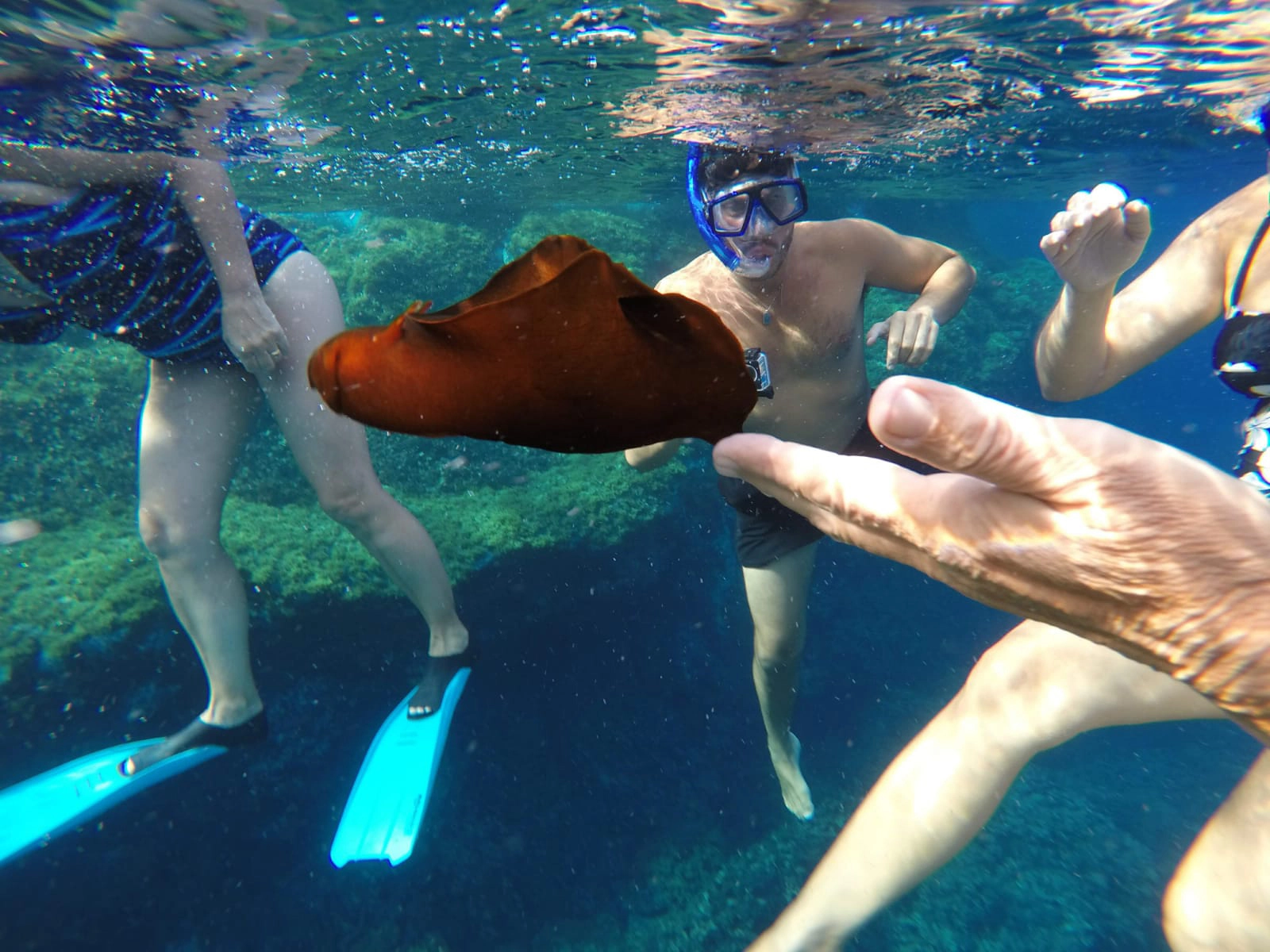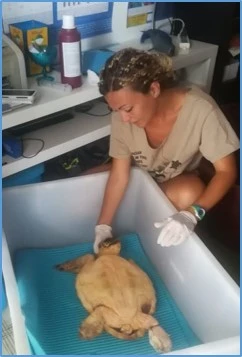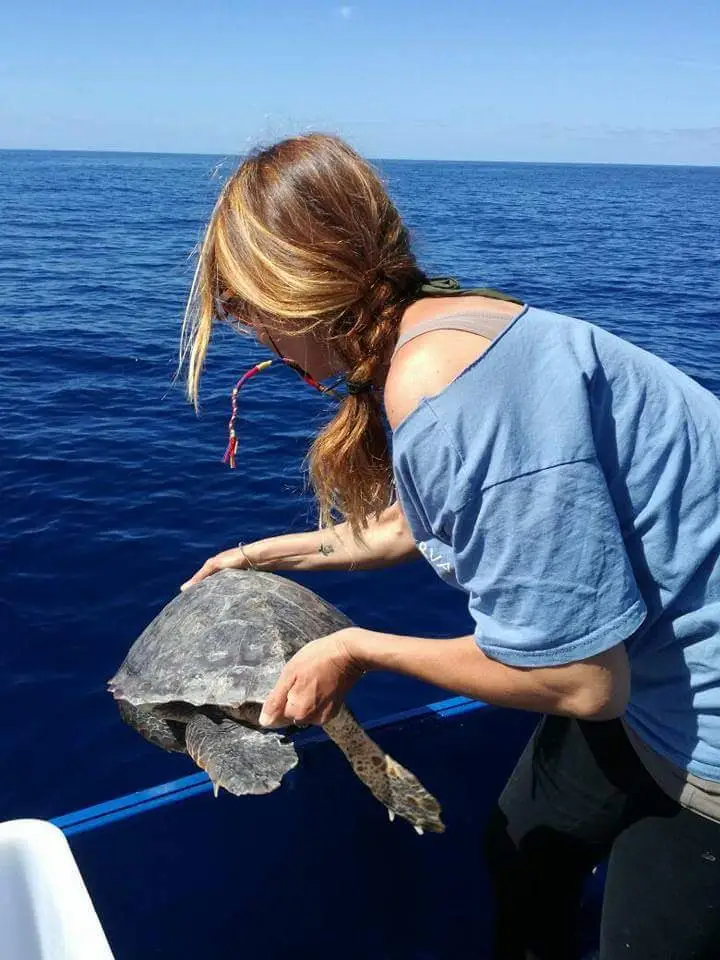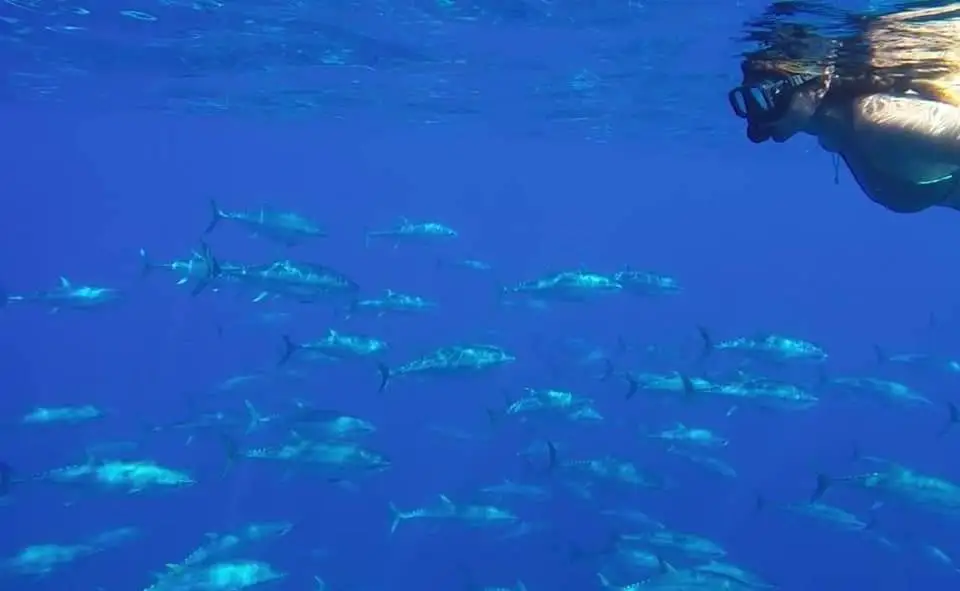

For years the Filicudi WildLife Conservation Association has been involved in research applied to the conservation of cetaceans and sea turtles in the Aeolian Archipelago. A lot of the work is the outcome of the incredible collaboration with public and private research institutions and many Italian universities.
The activities related to cetaceans are mainly concentrated on two species of dolphins that live in the Aeolian coastal environment: the bottlenose dolphin (Tursiops truncatus) and the striped dolphin (Stenella Coeruleoalba). The Association axlso studies sperm whales (Physeter macrocephalus), the largest among the odontocetes using the technique of photo identification and bioacoustics.

There's a team of researchers and volunteers behind the Filicudi WildLife Conservation Project - here they are in action
The bottlenose dolphin (Tursiops truncatus) is undoubtedly the best known among all the odontocetes present in the Mediterranean Sea. The populations of bottlenose dolphins living in coastal waters are subject to various human threats such as a direct competition with artisanal fishing activities, bycatch (accidental entrapment) in fishing gear and the lack of food due to overexploitation of fish resources. Although it is really difficult to quantify the actual impact of these threats, the sum of these impacts is leading to a net decline in dolphin population on a local scale.
Some locations are particularly strategic for the feeding of this species and they could be included in the future planning and management of the protected marine area of the Aeolian Archipelago. A thorough piece of research involving the definition of the behavioural ecology of the species is currently underway.
The Filicudi WildLife Conservation Association also coordinates a conservation project on the common sea turtle Caretta Caretta.
The Aeolian habitat is particularly favourable for the feeding and wintering activities of this species despite the fact that breeding sites are not present in this area without sandy beaches. The Caretta Caretta is a sea turtle that is widely present in the seas of temperate zones and in the tropical and subtropical seas of the Atlantic, Pacific and Indian oceans. After the first vital phase when the younger turtles tend to simply get dragged by the sea currents, the specimens of Caretta Caretta tend to frequent deeper waters and prefer to feed with algae. It is precisely in this phase of the life cycle that turtles may encounter greater threats such as the accidental capture in fishing nets and other fishing materials.
Freeing Pirilla turtle! Have a great life Pirilla!
We meet Chiara, a researcher who has been working for the Filicudi Wildlife Conservation Association for several years. She’s obtained a bachelor degree in Marine Biology and Ecology at the University of Messina with a thesis on the reproductive parameters of bottlenose dolphins in the Aeolian Islands.

Chiara Bruno, researcher and co-founder of the Association
"I think back to when as a child my grandfather took me to Filicudi on summer vacation for the first time. I used to grab lobsters by their antennae and then gently place them back down; whilst swimming in front of the pier I would contemplate octopuses, scorpionfishes, mullets and local crabs; I would see huge amberjacks, groupers, tuna, manta rays, dolphins, whales. This sea habitat is slowly disappearing. My immense love for the sea and my desire to preserve it has been my personal drive to devote myself fully to scientific research.
That is why I decided to undertake my Master in Animal Biodiversity Conservation project right here, studying the population of bottlenose dolphins, coastal dolphins living in the waters of the Aeolian Archipelago. Now this species is near extinction here in the Aeolian Islands. Driven by a love for this place and its wonderful habitat, in 2004 I decided to found the Association. I also started to catch sight of specimens of sea turtles, sadly sometimes in poor health conditions. In 2010 I was authorized by the Ministry of the Environment to start our First Aid for Marine Turtles project."

"Over these years, we have been able to seal numerous scientific collaborations across multiple research projects both on dolphins and sea turtles. We’ve also increased the awareness of the scientific projects we carry out in the Archipelago. An experimentation project, funded by Blue Marine Foundation and SeaWorld & Busch Gardens Conservation Fund kicked off in 2017 to address the dolphin-fishing problem in the Aeolian Islands.
Another great milestone for us has been the TartaNet project: from the collaboration between the Aeolian Island Preservation Fund and the Blue Marine Foundation in 2019, this project focuses on the rescue of the Caretta caretta species in the Aeolian Archipelago.
Ongoingly, we do our best to rescue all animals in danger which get reported regularly by boats. Alongside the TartaNet project, we’ve recently launched the TartaNest project which is aimed at creating a monitoring network of Caretta caretta nest traces in the sandy beaches of the islands of Lipari, Stromboli and Vulcano. Thanks to our collaboration with the Island of Lipari, we were able, this year alone, to fence the cave of the Sea Ox and Horse with ecological buoys, a big step forward to protect the variety and wealth of the seabed in this area of the Mediterranean.
One of our objectives is also to set the foundations for a designated marine area to protect all autochthonous species, from bacterial to top predators, in the hope of retaining everything I saw in my childhood and that led me to love the sea so much."
"We have started several courses in marine and terrestrial biology, as well as distance learning on environmental education, like the project called At school with nature (A Scuola con La Natura), working with schools on the Aeolian Islands. We find that the children who visit the islands, whether islanders or tourists are very curious, aware and sensitive to environment-related problems. On top of that many of the local fishermen are aware of the depletion of fish resources and are willing to change their traditional ways of fishing.
The lack of listening in the scream that this sea makes in asking for help is not understood by the large commercial fishing of non-local fishermen and those who, without giving breath, use prohibited fishing gear but continue to be wandering around the sea, killing myriads of species. The attitude of those who travel greatly affects the environment, in terms of waste production, water consumption and resource consumption."

"Our advice is to choose associations that preach sustainable tourism or to take you on natural excursions by boat. Make sure you bring your snorkelling mask to help you enjoy the landscape that lies under the sea even more.
Our Association offers tourists an authentic experience that can convey our immense love for each island in the Archipelago and we take time to explain both geology, flora and fauna, even terrestrial, local traditions and the importance that each organism has in that blue dimension and that a tourist would not grasp alone. The goal is that this experience remains a positive memory and is the result of curiosity and knowledge.
"LifeDelfi is a project funded by the European Commission through the LIFE program, with the aim of reducing interactions between dolphins, mainly of the species Tursiops truncatus, and professional fishing activities. These interactions are an environmental risk because dolphins often get caught in fishing nets as they try to feed themselves, with the risk of getting seriously injured.
LifeDelphi focuses on the protection of the coastal dolphin (Tursiops truncatus), through concrete actions with the involvement of fishermen such as the use of acoustic and visual mitigation tools and alternative and eco-sustainable tools, experimenting integrated solutions to reduce the conflict between fishermen and these marine mammals. One of the preliminary steps is to create an understanding with the fisherman, chatting with them about the problems encountered by this ongoing conflict with dolphins."
You can find out more on the Life Delfi project on Instagram
We collect funds in two ways, via our research fields and via our summer tourism activities. The research camps are designed primarily for young university graduates but are open to all sea lovers. For a week our volunteers take part in dolphin and turtle monitoring activities, help us collecting data and cataloguing them, managing environmental education activities for tourists. The other way we finance our research activities is through tourism. During the summer, we organize boat trips, guided snorkelling with marine biology lessons and guided trekking on the paths of the island.
You can also help with the Association’s mission in practical terms. When you spot a cetacean or sea turtle while visiting the Archipelago by boat you can contact the Association on the number +39 349 4402021 this will help with the work they’re doing with the monitoring and preservation of the Aeolian ecosystem.
To find out more about the Filicudi Wildlife Conservation Association you can visit their website here You can also start following all the projects they are running on the Filicudi Wildlife Conservation Association Facebook page or the Instagram page
If you liked what you've just read, you'll find more articles on similar initiatives as well as culinary itineraries, tips on sailing destinations plus stories from expert sailors and first-timers in our brand new digital magazine - Magister Navis. It will surely guide your way to your next sail!

Our regular email newsletters include information about our boats, holiday ideas, destination insights and cultural briefings. You can unsubscribe at any time and we'll treat your data with respect, never passing on your details to third parties. Find full details of our data management in our Privacy policy page
By signing up, I agree to Sailogy's T&C's and Privacy policy

Looking for inspiration for your next sailing holiday? Packed with insights on trending sailing destinations plus stories from expert sailors and first-timers, our brand new digital magazine - Magister Navis - will guide your way to your next sail.
View magazine